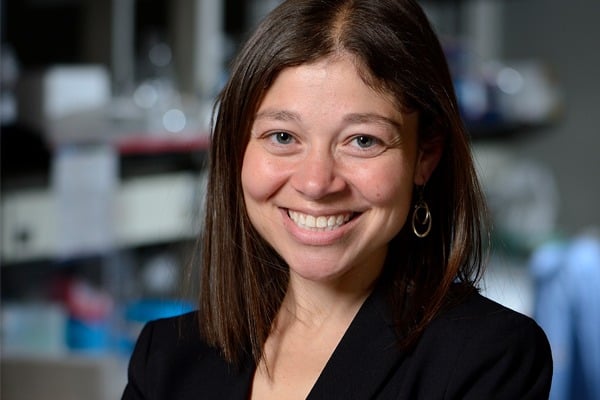Meet Jamie Spangler, assistant professor of BME

Jamie Spangler is an assistant professor in the Department of Biomedical Engineering, with a joint appointment in the Department of Chemical and Biomolecular Engineering, at Johns Hopkins University. Through her pioneering research in the fields of immunoengineering and biomolecular engineering, Spangler aims to expand the repertoire of protein therapeutics for treating disease. Her current work focuses on redesigning naturally occurring proteins and engineering new molecules to overcome the deficiencies of existing drugs.
In this interview, Spangler discusses her goals as a researcher and mentor, what sparked her interest in science and engineering, and how incoming students can maximize their educational experience at Johns Hopkins.
You graduated from Hopkins with your bachelor’s degree in biomedical engineering in 2006. What has changed in the department since you were a student?
The biggest change I have noticed since returning to Hopkins is that the department has expanded, both in terms of space and in terms of research breadth. Hopkins has always been a leading force in biomedical engineering, but the new buildings, centers, and facilities have galvanized the next generation of BME research and education. In addition, the scope of the department has extended to pioneer new and emerging areas such as genomic/epigenomic engineering, data-intensive biomedical science, and immunoengineering.
Now that you’re on the other side, can you share any advice for current students?
I would advise current students to take advantage of the unparalleled research and educational facilities available to them at JHU. It can be overwhelming to face so many new and unique opportunities while juggling the rigorous academic courseload, but I would encourage undergraduates to drink in as much as they can while they are here.
You’re approaching the end of your first year as an assistant professor at Johns Hopkins. What do you see as your biggest accomplishment so far?
I am most proud of the immensely talented team of trainees I have assembled and how quickly they have gotten things up and running in the lab. I am fortunate to have a dedicated and passionate group of scientists from a range of academic and research backgrounds who work independently, yet synergistically, to tackle challenging questions in molecular immunoengineering. I am also thrilled to have published our first article this March in Current Opinion in Chemical Engineering.
What first sparked your interest in science and engineering?
My father, a career mathematics educator, helped ignite and cultivate my interest in math and science from a young age. He worked for a textbook publishing company and would bring home puzzles and problems — I couldn’t get enough! As my interest in life sciences grew, I became excited about the possibility of applying mathematics to biology and medicine, fueling my pursuit of biomedical engineering.
Can you share your thoughts on getting more young women and girls interested in STEM?
I think the key is to expose people to scientific research at an early age and to emphasize that this can be a fulfilling and rewarding career to pursue. Many young people do not realize that a scientist is more than just some quirky caricature in a white coat, but rather a pioneer, conducting groundbreaking research that is changing the world!
What are your goals, either for your research or as a mentor?
My goals as a researcher and a mentor are unified, as they all center around maximizing my impact on society. The ultimate objective of my research is to translate basic advances in biomolecular engineering to address relevant disease challenges. I hope that my lab will advance new technologies and design novel therapeutics to treat immune pathologies such as cancer, chronic infection, and autoimmune disorders. I feel it is essential to push concepts in the lab from discovery through both the implementation and application phases to bridge the gap between cutting-edge research and transformational changes in medical science. As a mentor, I hope to inspire others to identify and pursue their passions. I feel that I can have the broadest and most lasting impact through training other scientists who will pursue a variety of career paths and become leaders in a wide range of disciplines, many of which we cannot yet envision.
